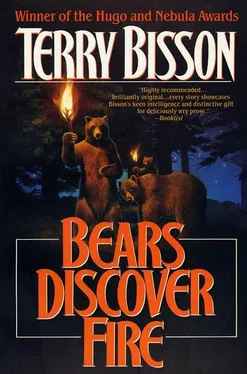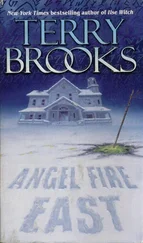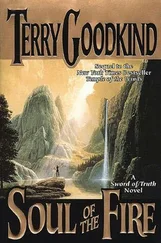“The films in the waiting room aren’t bad,” I said. “I watched them twice.”
“I promise an official briefing when you get to Houbolt. I just wanted to welcome you to the E team.”
“Does this mean I passed my medicals?”
She rang off impatiently and it struck me as I hung up that the whole purpose of the call had been to get a look at me.
They finished with me at nine P.M. The next morning at seven, I was loaded into a fat-tired van and taken twelve miles north on a paved highway, then east on a track across a lava field. I was the only passenger. The driver was a descendant (or so he said) of Huggard the Grasping, one of the original lost settlers of Newfoundland. After an hour we passed through the gates of an abandoned air base. Huggard pointed to a small lava ridge with sharp peaks like teeth; behind it I noticed a single silver tooth, even sharper than the rest. It was the nose cone of an Ariane-Daewoo IV.
The Commission had given up the advantages of an equatorial launch in order to preserve the secrecy of the project; this meant that the burn was almost twenty-eight minutes long. I didn’t mind. I hadn’t been off planet in eleven years, and the press of six gravities was like an old lover holding me in her arms again. And the curve of the planet below—well, if I had been a sentimental man, I would have cried. But sentiment is for middle age, just as romance is for youth. Old age, like war, has colder feelings; it is, after all, a struggle to the death.
High Orbital was lighted and looked bustling from approach, which surprised me; the station had been shut down years ago except for fueling and docking use. We didn’t go inside; just used the universal airlock for transfer to the lunar shuttle, the dirty but reliable old Diana in which I had made so many trips. She was officially Here’s Johnny’s command, but he was on rotation: presumably his reward for bringing me in alive.
When we old folks forget how decrepit and uninteresting we are, we can count on the young to remind us by ignoring us. The three-person crew of the Diana kept to themselves and spoke only Russo-Japanese. It made for a lonely day and a half, but I didn’t mind. The trip to the Moon is one of the loveliest there is. You’re leaving one ball of water and heading for another of rock, and there’s always a view.
Since the crew didn’t know I speak (or at least understand) a little RJ, I got my first clue as to what my assignment might be. I overheard two of them speculating about “ET” (a name that is the same in every language) and one said: “Who would have thought the thing would only relate to old folks?”
That night I slept like a baby. I woke up only once, when we crossed over what we lunies used to call Wolf Creek Pass—the top of the Earth’s (relatively) long, steep gravitational well, and the beginning of the short, shallow slope to the Moon. In zero g there’s no way this transition can be felt: yet I awoke, knowing exactly (even after eleven years) where I was.
I was on my way back to the Moon.
Situated on the farside of the Moon, facing always away from the Earth, Houbolt lies open to the Universe. In a more imaginative, more intelligent, more spirited age it would be a deep-space optical observatory; or at least a monastery. In our petty, penny-pinching, paranoid century it is used only as a semiautomated Near-Earth-Object or asteroid early-warning station. It wouldn’t have been kept open at all if it were not for the near-miss of NEO 2201 Oljato back in ’14, which had pried loose UN funds as only stark terror will.
Houbolt lies near the center of the farside’s great Korolev crater, on a gray regolith plain ringed by jagged mountains unsmoothed by water, wind, or ice; as sheer as the lava sills of Iceland but miles instead of meters high; fantastic enough to remind you over and over, with every glance, that they are made of Moon, not Earth; and that you are in their realm; and that it is not a realm of living things.
I loved it. I had helped build and then maintain the base for four years, so I knew it well. In fact, on seeing that barren landscape again, in which life is neither a promise nor a memory, not even a rumor, I realized why I had stayed in the desert after retirement and not gone back to Tennessee, even though I still had people there. Tennessee is too damn green.
Houbolt is laid out like a starfish, with five small peripheral domes (named for the four winds, plus Other) all connected by forty-meter tubes to the larger central dome known as Grand Central. Hvarlgen met me at the airlock in South, which was still the shop and maintenance dome. I felt at home right away.
I was a little surprised to see that she was in a wheelchair; other than that, she looked the same as on the screen.
The blue eyes were even bluer here on the blueless Moon.
“Welcome to Houbolt,” she said as we shook hands. “Or back, maybe I should say. Didn’t South here used to be your office?” The Moon with its .16g has always drawn more than its share of ’capped, and I could tell by the way she spun the chair around and ran it tilted back on two wheels, that it was just right for her. I followed her down the tube toward Grand Central.
I had been afraid Houbolt might have fallen into ruin, like High Orbital, but it was newly painted and the air smelled fresh. Grand Central was bright and cheerful. Hvarlgen’s team of lunies had put in a few spots of color, but they hadn’t overdone it. All of them were young, in bright yellow tunics. When Hvarlgen introduced me as one of the pioneers of Houbolt, none of them blinked at my name, even though it was one of twenty-two on a plaque just inside the main airlock. I wasn’t surprised. The Service is like a mold, an organism with immortality but no memory.
A young lunie showed me to my windowless pie-shaped “wedgie” in North. A loose orange tunic with a SETI patch lay folded on the hammock. But I wasn’t about to put on Hvarlgen’s uniform until I learned what she was doing.
I found her back in Grand Central waiting by the coffee machine, a giant Russian apparatus that reflected our faces like a funhouse mirror. I was surprised to see myself. When you get to a certain age you stop looking in mirrors.
A hand-drawn poster over the machine read D=118.
“Hours until the Diana returns,” Hvarlgen said. “The lunies see this as a hardship assignment, surprisingly enough. They’re only used to being here a day or two at a time.”
“You promised a briefing,” I said.
“I did.” She drew me a coffee and pointed out a seat. “I assume, since gossip is still the fuel of the Service, that in spite of our best efforts you have managed to learn something about our project here.” She scowled. “If you haven’t, you’d be too dumb to work with.”
“There was a rumor,” I said. “About an ET.”
“An AO,” she corrected. “At this point it’s classified only as an Anomolous Object. Even though it’s not in fact an object. More like an idea for an object. If my work—our work—is successful and we make contact, it will be upgraded to an ET. It was found in Earth orbit some sixteen days ago.”
I was impressed. Here’s Johnny hadn’t told me how quickly all this had been pulled together. “You all move fast,” I said.
She nodded. “What else did you hear?”
“ Voyager ,” I said. “‘Send more Chuck Berry.’”
“ Voyager II, actually. Circa 1977. Which left the heliosphere in 1991, becoming the first human-made object to enter interstellar space. Last month, more than fifty years after its launch, it was found in high Earth orbit with its batteries discharged, its nuclears dead, seemingly derelict. Space junk. How long it had been there, who or what returned it, and why—we still don’t know. As it was brought into lock aboard the recovery vessel, the Jean Genet, what had appeared to be a shadow attached itself to one of the crew, one Hector Mersault, apparently while they were unsuiting. They didn’t notice at first, until they found Mersault sitting in the airlock, half undressed and dazed, as if he had just come out from under anesthesia. He was holding his helmet and the shadow was pooled in it; apparently our AO likes small spaces, like a cat.”
Читать дальше












